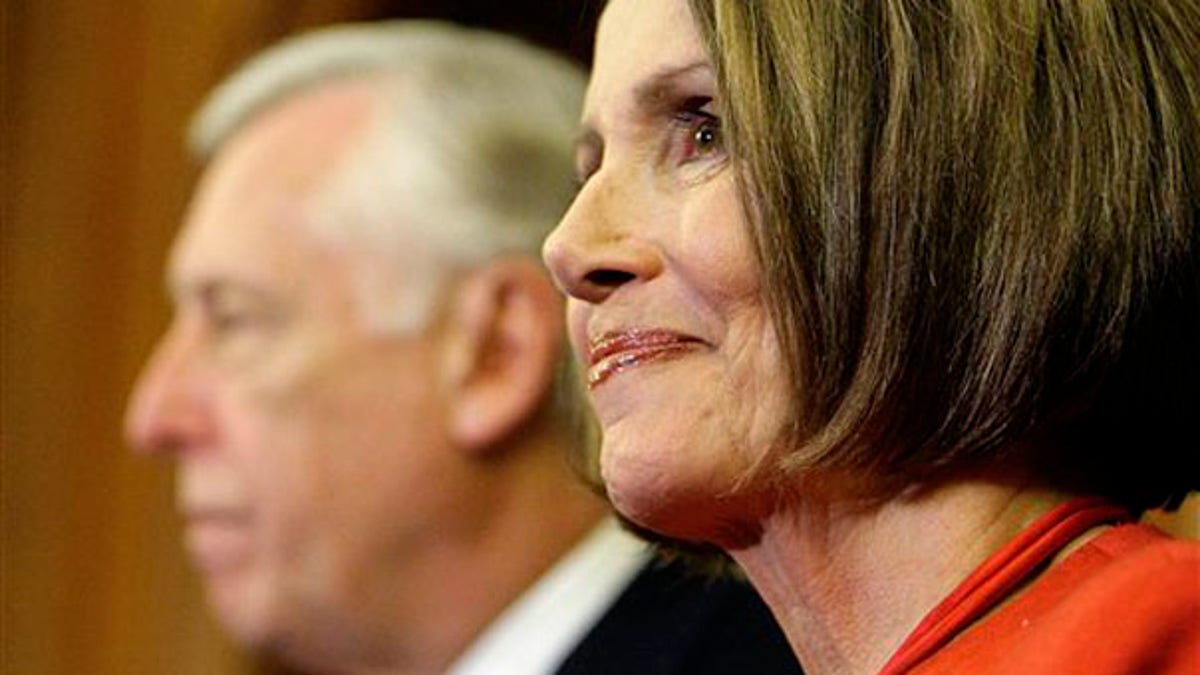
Speaker Nancy Pelosi smiles at a press conference at the U.S. Capitol Nov. 7, as House Majority Leader Steny Hoyer looks on. (AP Photo)
Do not mess with this bill.
That was the message Senate Democrats sent to their colleagues on the House side over the weekend, warning them not to make any significant changes to the health care package heading toward a vote in their chamber if they want the bill to survive past Christmas.
Senate Majority Leader Harry Reid on Saturday won the support of the last known Democratic holdout, Sen. Ben Nelson, D-Neb., giving him the 60 votes necessary to pass the bill out of the Senate. But assuming the bill clears the Senate, negotiators from both sides will still have to work out vast differences between the House and Senate versions in what's known as a conference committee.
Liberal Democrats are eager to negotiate and try to win back items that were stripped from the Senate bill like a government-run insurance plan. But the final version would again need 60 votes to overcome a Senate filibuster, and Senate moderates warn that any big changes in conference could erode that bloc.
"Anybody who's watched this process can see how challenging it has been to get 60 votes," Sen. Kent Conrad, D-N.D., said on "Fox News Sunday." "It is very clear that the bill, the final bill, to pass in the United States Senate is going to ... have to be very close to the bill that has been negotiated here. Otherwise you will not get 60 votes in the United States Senate."
The Senate bill was heading toward a critical test vote set for after midnight early Monday.
Nelson bluntly warned Saturday that even though he planned to vote for the Senate bill this coming week, that pledge might not apply to the version that emerges from the House and Senate negotiations.
"If there are material changes in that conference report different from this bill that adversely affect the agreement, I reserve the right to vote against the next cloture vote," he said. "Let me repeat it, I reserve the right to vote against the next cloture vote, if there are material changes to this agreement in the conference report. And I will vote against it if that is the case."
Cloture is the process of cutting off debate that requires 60 votes. Because the Democrats have exactly a 60-vote majority in the Senate, party leaders had to individually accommodate every holdout in their party to move the bill forward -- particularly since no Republicans are on board.
This resulted in a bill that looks very different from the House version.
But despite the tenuous support on the Senate side, liberal Democrats continue to call for major revisions in the conference committee.
Former Democratic National Committee Chairman Howard Dean, who has led the fight against the Senate version, said Sunday that "we really do need some kind of a public option" in the bill.
"Let's see if we can fix it some more," Dean said on NBC's "Meet the Press." "This can't be the final version of this bill."
Dean complained that President Obama did not end up fighting for the so-called public option in the Senate version.
"We've been very disappointed by that. We don't think that there has been much fight in the White House for that," he said.
The White House has made clear that passage of a health care reform bill is far more important than the survival of any one provision in it.
Senior Adviser David Axelrod expressed confidence Sunday that the intra-party disputes over the contents of the bill will ultimately be resolved.
"I think we're going to get it done," he said on "Meet the Press," disputing Dean's characterizations of the bill. "I think that people understand that this is a historic crossroads."











































